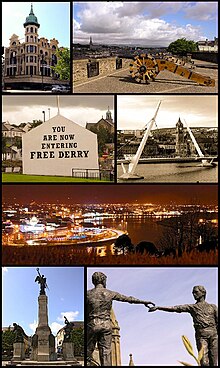Portal:Northern Ireland
|
The Northern Ireland Portal
Introduction  Northern Ireland (Irish: Tuaisceart Éireann [ˈt̪ˠuəʃcəɾˠt̪ˠ ˈeːɾʲən̪ˠ] ⓘ; Ulster Scots: Norlin Airlann) is a part of the United Kingdom in the north-east of the island of Ireland that is variously described as a country, province or region. Northern Ireland shares an open border to the south and west with the Republic of Ireland. At the 2021 census, its population was 1,903,175, making up around 3% of the UK's population and 27% of the population on the island of Ireland. The Northern Ireland Assembly, established by the Northern Ireland Act 1998, holds responsibility for a range of devolved policy matters, while other areas are reserved for the UK Government. The government of Northern Ireland cooperates with the government of Ireland in several areas under the terms of the Belfast Agreement. The Republic of Ireland also has a consultative role on non-devolved governmental matters through the British–Irish Governmental Conference (BIIG). Northern Ireland was created in 1921, when Ireland was partitioned by the Government of Ireland Act 1920, creating a devolved government for the six northeastern counties. As was intended by unionists and their supporters in Westminster, Northern Ireland had a unionist majority, who wanted to remain in the United Kingdom; they were generally the Protestant descendants of colonists from Britain. Meanwhile, the majority in Southern Ireland (which became the Irish Free State in 1922), and a significant minority in Northern Ireland, were Irish nationalists (generally Catholics) who wanted a united independent Ireland. Today, the former generally see themselves as British and the latter generally see themselves as Irish, while a Northern Irish or Ulster identity is claimed by a significant minority from all backgrounds. The creation of Northern Ireland was accompanied by violence both in defence of and against partition. During the conflict of 1920–22, the capital Belfast saw major communal violence, mainly between Protestant unionist and Catholic nationalist civilians. More than 500 were killed and more than 10,000 became refugees, mostly Catholics. For the next fifty years, Northern Ireland had an unbroken series of Unionist Party governments. There was informal mutual segregation by both communities, and the Unionist governments were accused of discrimination against the Irish nationalist and Catholic minority. In the late 1960s, a campaign to end discrimination against Catholics and nationalists was opposed by loyalists, who saw it as a republican front. This unrest sparked the Troubles, a thirty-year conflict involving republican and loyalist paramilitaries and state forces, which claimed over 3,500 lives and injured 50,000 others. The 1998 Good Friday Agreement was a major step in the peace process, including paramilitary disarmament and security normalisation, although sectarianism and segregation remain major social problems, and sporadic violence has continued. (Full article...) Selected article -Derry, officially Londonderry, is the largest city in County Londonderry, the second-largest in Northern Ireland and the fifth-largest on the island of Ireland. The old walled city lies on the west bank of the River Foyle, which is spanned by two road bridges and one footbridge. The city now covers both banks (Cityside on the west and Waterside on the east). The population of the city was 85,279 in the 2021 census, while the Derry Urban Area had a population of 105,066 in 2011. The district administered by Derry City and Strabane District Council contains both Londonderry Port and City of Derry Airport. Derry is close to the border with County Donegal, with which it has had a close link for many centuries. The person traditionally seen as the founder of the original Derry is Saint Colmcille, a holy man from Tír Chonaill, the old name for almost all of modern County Donegal, of which the west bank of the Foyle was a part before 1610. (Full article...) Selected picture -Northern Ireland listsRelated portalsSelected biography -Robert William McConnell (c. 1944 – 5 April 1976), was an Ulster loyalist paramilitary who allegedly carried out or was an accomplice to a number of sectarian attacks and killings, although he never faced any charges or convictions. McConnell served part-time as a corporal in the 2nd Battalion Ulster Defence Regiment (UDR), and was a suspected member of the Ulster Volunteer Force (UVF). In 1993, Yorkshire Television broadcast a programme The Hidden Hand: the Forgotten Massacre, and the narrator named McConnell as a member of one of the two UVF bomb teams that perpetrated three car bomb attacks in Dublin on 17 May 1974, which killed 26 people. The programme also linked him to British military intelligence and Captain Robert Nairac, stating that McConnell and key figures from the bombing unit were controlled before and after the bombings by Nairac. RUC Special Patrol Group (SPG) officer John Weir alleged that McConnell had been part of the UVF unit that shot leading Provisional IRA man John Francis Green to death in January 1975. Weir also alleged that McConnell had been one of the gunmen in the Reavey family shootings, as well as having had a key role in the bomb and gun attack against Donnelly's Bar the previous month. These were part of a series of sectarian attacks and killings that were carried out by the group of loyalist extremists known as the Glenanne gang, of which McConnell was a member. This gang comprised rogue elements of the Royal Ulster Constabulary (RUC), the SPG, Ulster Defence Regiment (UDR), and the UVF's Mid-Ulster Brigade, which from 1975 to the early 1990s was commanded by Robin "the Jackal" Jackson. Jackson was also implicated by the Hidden Hand in the Dublin and Monaghan bombings, and he was reportedly involved in the Green assassination. (Full article...) Did you know (auto-generated) -
WikiProjectsThings you can do
TopicsCategoriesRecognized Content
Featured articlesGood articles
Featured listsAssociated WikimediaThe following Wikimedia Foundation sister projects provide more on this subject:
Northern Ireland on Wikipedia
Web resources
Discover Wikipedia using portals |










































